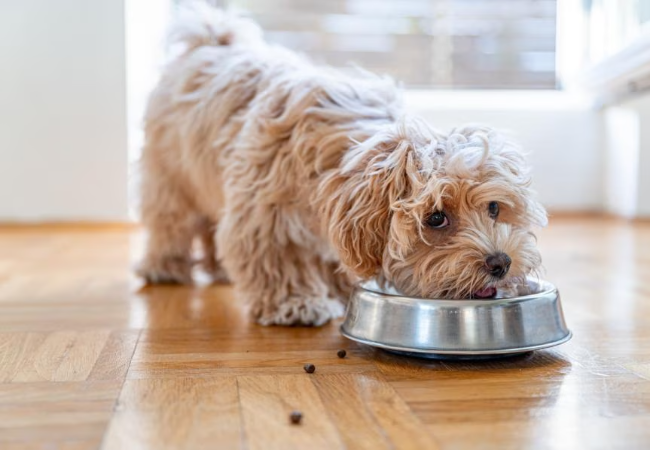What to Feed a Dog with Bladder Stones 2025: Vet Approved Guide 🐶

In this article
What to Feed a Dog with Bladder Stones 2025: Vet Approved Guide 🐶
By Dr. Duncan Houston BVSc
🔬 Understanding Bladder Stone Types
Bladder stones (uroliths) form when urinary crystals aggregate. Common types include:
- Struvite: Magnesium-ammonium-phosphate stones, often infection-related and dissolvable with diet.
- Calcium Oxalate: Not dissolvable; preventable through dilution and diet.
- Urate: Linked to Dalmatians and purine metabolism; low-purine diet essential.
- Cystine & Others: Require special low-protein or alkalinizing diets.
⚖️ Objectives of Dietary Management
- Provide complete nutrition while encouraging urine dilution
- Adjust pH specific to stone type
- Reduce formation risk by controlling mineral intake (magnesium, calcium, phosphorus, purines, oxalates)
🥣 Feeding Strategies by Stone Type
1. Diet for Struvite Stones
Diet-based dissolution is effective. Veterinary therapeutic diets like Royal Canin Urinary, Hill’s c/d, or Purina UR reduce magnesium, protein, and acidify urine.
Focus on:
- High moisture intake via wet or broth-moistened food
- Products designed to achieve pH ≤6.5
- Exclusivity—no treats unless stone-safe.
2. Diet for Calcium Oxalate Stones
These can’t dissolve—but diet aids prevention:
- Use therapeutic urinary diets (e.g. Royal Canin SO, Purina UR Ox/St™, Hill’s c/d) to promote dilution and moderate intake.
- Avoid high-oxalate foods like spinach, beets, nuts.
- Increase water intake—consider canned food or added water.
3. Diet for Urate Stones
Treat urate stones with low-purine, diluted, alkaline diets.
- Reduce purines (organ meats, game, anchovies).
- Use sodium-rich diets to increase thirst and dilute urine.
- Allopurinol may help if due to genetic purine metabolism.
🍲 Fresh or Homemade Feeding Approaches
For owners preferring fresh meals:
- Base meals on lean, low-mineral proteins (poultry, fish, egg whites).
- Avoid oxalate-rich ingredients.
- Ensure complete balance—use veterinary nutrition guidance.
Example struvite‑support recipe: turkey + white rice + steamed zucchini + broth.
💧 Hydration & Urine Dilution
- Ensure constant fresh water and use water bowls in multiple spots.
- Offer canned food or add ¼–½ cup water per serving.
- Encourage frequent urination—short walks or frequent toilet breaks.
🥗 Safe Treats & Add‑Ons
- Vegetables like peeled apples, cauliflower, cucumber (low oxalate).
- Lean chicken, turkey, cooked egg whites (moderate purine).
- Avoid organ meats, spinach, sweet potato, beets, nuts, shellfish.
⚠️ Monitoring & Consultation
- Recheck urinalysis, pH, ultrasound/X-ray after 4–6 weeks or per vet guidance.
- Institute lifelong therapeutic feeds for calcium oxalate clients.
- Analyze stones after removal to guide future diet.
- Check for recurrent urinary infections—consider periodic cultures.
📋 Dr Houston’s Bladder Stone Diet Checklist
- ✔️ Identify stone type → tailor diet accordingly
- ✔️ Choose therapeutic or fresh diet for stone therapy/prevention
- ✔️ Promote hydration via canned/fresh food + water
- ✔️ Eliminate stone‑promoting ingredients & unsafe treats
- ✔️ Offer safe low‑oxalate/purine treats
- ✔️ Repeat urine testing and stone monitoring regularly
- ✔️ Maintain lifelong diet for calcium oxalate cases
- 📱 Ask A Vet for personalized diet formulation or recipe review
🌟 Final Thoughts
Feeding a dog with bladder stones requires targeted nutrition: therapeutic diet or balanced fresh recipes, focused hydration, and long-term prevention strategies. With vet supervision, stone‑type‑specific diet, and routine monitoring, most dogs remain stone‑free and thriving. If you need help creating a tailored feeding plan or managing recurrence, visit AskAVet.com or download the Ask A Vet app for personalized veterinary guidance. 📱🐾






